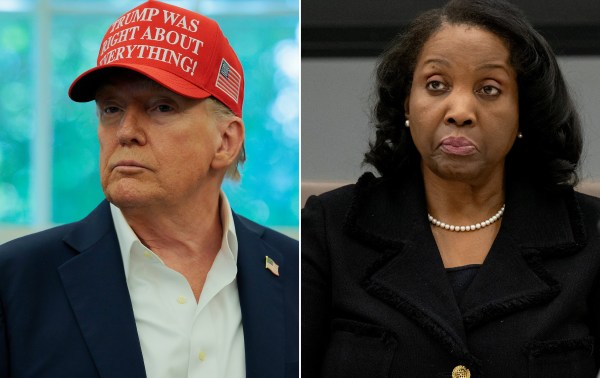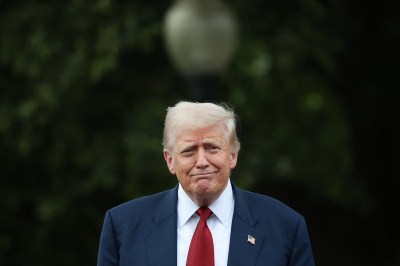The Dispatch is proud to provide educators, clergy, retirees, military veterans, and students discounted access to our journalism. Check out the list and apply here if one of these categories applies to you.
We shouldn’t be thinking about the post-Trump era at a moment when the Trump era is only just hitting its authoritarian stride, with well over 80 percent of the president’s second term still to go. There are more urgent topics for a daily politics newsletter to take up.
But I am thinking about it. Specifically, I’m thinking that one of the most obnoxious things about the post-Trump political environment will be having to listen to Republican officials who bit their tongues for more than a decade finally confess to the moral and ethical qualms they’ve harbored since, oh, June 2015.
Gutless, hypocritical, careerist cretins. The MAGA diehard who follows Donald Trump blindly offends me less than the coward who does so despite seeing clearly; the former at least doesn’t pretend to be respectable. When the time comes, the president’s critics should receive the latter’s belated attempt at rehabilitation with every bit of contempt it deserves.
As a non-paying reader, you are receiving a truncated version of Boiling Frogs. You can read Nick's full newsletter by becoming a member here.
Here, via Mona Charen, is a non-exhaustive list of what the “good Republicans” in the party are quietly tolerating at this very moment:
Trump has solicited the gift of a jet from a foreign potentate. He has prostituted his office to the highest bidder by floating meme coins. He has pardoned more than 1,500 rioters who attempted to steal the 2020 election for him. He has shaken down leading law firms, media companies, and universities by threatening their livelihoods with government action. He has removed protection from recent immigrants, like Afghans, who risked their lives to ally with us. He has cut off humanitarian aid to millions of the world’s poor without so much as a fig leaf by way of explanation. He has appointed conspiracy nuts and kooks to key government posts like the Department of Health and Human Services, the National Counterterrorism Center, and as Director of National Intelligence. He has deported innocent people to torture chambers in foreign countries. And always and everywhere, he has annihilated truth, most recently by firing the commissioner of the Bureau of Labor Statistics because her agency produced honest numbers rather than the ones the president preferred.
There’ll be oh so many oh-so-sorry GOPers eager to admit that things went a bit too far once the president is no longer around to punish them for speaking up—or so I’m prone to telling myself.
Then it occurs to me (and this rarely occurs to me) that I’m being too optimistic. The share of Republicans willing to repudiate any part of Trump’s legacy, even the most disgusting parts, may be smaller than anyone expects.
Take North Carolina Sen. Thom Tillis, who announced his retirement in June after the president threatened to primary him into oblivion. “I look forward to having the pure freedom to call the balls and strikes as I see fit,” Tillis warned at the time, a hint that he would no longer rubber-stamp the usual populist crapola being dished out by the White House. A month later, he turned around and rubber-stamped Emil Bove’s nomination for a federal judicial vacancy.
Having been “freed” from Trump’s wrath by quitting electoral politics, the senator evidently decided that freedom is overrated.
It happened again last week when reporters asked him what he thought of Trump firing the head of the Bureau of Labor Statistics after a disappointing jobs report. The best the newly liberated Tillis could do was this: “If she was just fired because the president or whoever decided to fire the director … because they didn’t like the numbers, they ought to grow up.”
They? There is no “they” in this party. “I have directed my Team to fire this Biden Political Appointee, IMMEDIATELY,” Trump made clear in a post on Friday announcing his decision. Tillis blamed “the president or whoever” for the same reason that grassroots right-wingers reliably say of Trump’s stupidest decisions that “whoever advised him to do this should be fired.” To be a modern Republican, one must believe that the president is never responsible—even when he’s explicitly claiming responsibility.
Will that remain true once he’s no longer leading the GOP? Or will a Republican establishment suddenly granted the “pure freedom to call the balls and strikes” as it sees fit disclaim the sleaziest parts of his legacy?
Precedent: Clinton.
One way to answer that is to look at what happened when another party recently found itself saddled with the legacy of a disgraced, impeached former president. How did Democrats handle the ugliest episode of Bill Clinton’s tenure?
The same way political parties typically deal with things they’d rather not talk about: They stopped talking about it and more or less pretended like it never happened.
Clinton has been an ex-president for nearly 25 years, and in that span there have been precious few moments when his party showed remorse for defending him during the 1998 Monica Lewinsky scandal. He spoke on night one of the 2000 Democratic convention, as the then-sitting president, and has spoken at the same gathering every four years since.
His reputation within his party had recovered well enough by 2008 for him to serve as lead surrogate for his wife’s presidential campaign and in 2016 proved no impediment to her winning the Democratic nomination. “Recover” might be the wrong word, frankly, as his approval rating skyrocketed in 1998 when he was impeached. Liberals reframed the Clinton sex scandal as a scandal about Republican overreach, which helped rally Democrats behind him, and they never looked back.
The only time serious misgivings about his stature in the party have been expressed was during the #MeToo rage of 2017, when Sen. Kirsten Gillibrand said that he should have resigned over his affair while in office. But that’s the exception that proves the rule: Gillibrand had no objections to Clinton campaigning and hosting fundraisers for her between 2006 and 2010. She pretended to care about his sleaziness only once the culture had changed enough to make it politically safe for her to care, and not a moment sooner.
In sum, “this is old news, let’s just move on” has been the default Democratic approach to his scandal since he left office—and it sure has seemed to work. Establishment Republicans will try to emulate it after Trump departs in hopes of deflecting similarly uncomfortable questions about his behavior.
But the comparison isn’t apples-to-apples, is it?
To begin with, 9/11 helped spare Democrats from having to reckon with Clinton’s legacy. His corruption wasn’t relevant to anything anymore once terrorists attacked the World Trade Center and the Pentagon. The safe assumption is that Republicans won’t get a similar reprieve in 2029, which means they’ll have no excuse not to address Trump’s perceived failures—particularly as they splinter into factions and compete to control the direction of the party.
Trump will also end up engaging in more corruption, and of a much greater variety, as president than Clinton did. He already has, per Charen; one gets the sense that he’s only getting warmed up. The Democratic defense of Lewinsky-gate, that it was a private matter and lying about sex shouldn’t be a crime, ain’t gonna hack it to explain the GOP’s sustained indifference to bribery, extortion, and gratuitous ruthlessness. This is much worse than a zipper problem.
Meanwhile, Trump will assuredly leave office less popular than Clinton was. That’s not all his fault: In hyper-polarized 21st century America, no president will realistically touch the 66 percent approval that Clinton enjoyed in January 2001. But if the economic trouble to come from Trump’s trade policies is as bad as many experts expect, it’s more likely that he’ll retire with a rating in the 30s than one in the 50s. Republicans will need to answer for that.
All told, there are good reasons to believe that omerta won’t work as well for them in papering over Trump’s scandals as it did for Democrats in papering over Clinton’s. Hard political realities will require the Thom Tillises of the party to concede that, ahem, “they” in the Trump White House sure did do some scummy things that the next Republican leader must not repeat.
At least, that’s what an optimist would say.
Trump exceptionalism.
What I would say is that the point about apples-to-apples cuts both ways. The post-Trump right is sufficiently different from the post-Clinton left that Republicans will feel greater pressure not to speak ill of their disgraced ex-president than Democrats did. Their “pure freedom to call the balls and strikes” as they see fit will be nothing of the sort.
That starts with the fact that there’s no such thing as a “post-Trump right” until you-know-who heads off to the big golf course in the sky. As long as he has breath in him, a retired Trump will remain the most influential figure in the GOP and will aggressively punish any Republican who repudiates him.
That wasn’t true of Clinton. He had many powerful friends in his party who were willing to make trouble for his critics after he left office, but they weren’t so powerful that they managed to scare Barack Obama away from challenging Hillary Clinton for the Democratic nomination in 2008, were they?
Clinton has never had anything like Trump’s cultish power to vaporize a GOP official’s career by simply declaring him or her an enemy. Any “good Republicans” who speak up against his corruption circa 2029 in order to separate the party from it will find themselves anathematized by the president—or, if he’s no longer around and kicking, by the many ambitious demagogues on the right who are hoping to succeed him.
In a world without Donald Trump, will senators and congressmen still need to worry about offending Donald Trump Jr.? My guess is that they will. And if not him, certainly “fundamentalist MAGA” types will eagerly demagogue rival factions for criticizing the ex-president in hopes of winning the allegiance of his millions of supporters.
Another problem: In order for Republican officials to feel “safe” criticizing Trump, some sort of major cultural shift will need to take place that tilts the loyalty of Republican voters away from the president and toward some competing authority. In Clinton’s case that shift was #MeToo, which (briefly) made defending predatory men with the correct politics less important than defending women who’d been preyed on. In Trump’s case the shift would presumably involve right-wingers losing respect for postliberal autocracy and regaining respect for liberal institutions.
How does that shift happen, realistically?
Compared to Trump, Clinton’s legacy as leader of his party was easy for Democrats to repudiate and it still took them nearly 20 years to even semi-seriously try. He’s remembered now mainly for balancing the budget, presiding over a robust economy, and of course Lewinsky-gate; many leftists have little difficulty washing their hands of someone whose claims to fame are centrism and lechery.
Trump, on the other hand, successfully upended 35 years of ideological orthodoxy and (effectively) centuries of moral orthodoxy on the right. He’s remade his party in his image, leading a successful revolution whose core belief is contempt for any civic institution that would restrain his power. He’s less a president or a political leader, as we’ve traditionally understood those terms, than a prophet. To criticize him as a member of his party is to commit apostasy, which has never been true of Democrats and Bill Clinton.
I’m tempted to say that Republican voters would need to be clinically deprogrammed in order to change that. If instead we’re forced to rely on some organic cultural change to re-awaken their respect for liberal institutions, the only thing that might do it is a Democrat becoming president and running the same full-spectrum corrupt scams that Trump is running. And even then, instead of renouncing corruption, the dismal grassroots right would likely resolve to practice it twice as aggressively once they’re back in power in the name of owning the libs.
Nothing Trump himself might do before leaving office in 2029 will offend Republican voters so much as to restore their appreciation for checks and balances and disdain for a renegade executive. There are no exceptions to that statement.
The ethos.
Which brings us to the last reason that post-Trump Republicans probably won’t repudiate his scandals. The modern right believes as fervently in how politics should be practiced as it does in which sort of policies should be enacted. Truth be told, it doesn’t care much about policy: Observe the sea change in polls of right-wing opinion every time the president reverses himself on something like arms to Ukraine.
Trumpism is an ethos more than it is an agenda or program, one that I’m skeptical will evaporate once he loses control of the GOP. The ethos is that ruthlessness on behalf of one’s cause is always the proper course of action in politics. If you’re reluctant to show ruthlessness, you’re simply not “fighting” the enemy.
That logic also worked to some degree for Clinton during his 1998 impeachment. Democrats didn’t want to reward ruthless House Republicans by agreeing that the then-president had behaved like a sleazebag, so they rallied to him with similar ruthlessness, waving away his predation. But it would go too far to say that the point of Democratic politics writ large was to normalize acting ruthlessly.
We’re not going too far when we say that of Trump’s GOP. And because we aren’t, any Republican who’s considering denouncing the president’s corruption after he’s gone will be risking a special betrayal. They won’t just be disparaging a right-wing hero by doing so, they’ll be demonstrating their reluctance to “fight” the left as political players on all sides scramble to define Trump’s legacy. That they would be entirely correct in calling him a disgrace to the office is irrelevant; this party has an ethos and it has nothing to do with what’s true and what isn’t.
Criticizing former President Trump would be tantamount to a Republican official believing that monuments to the Confederacy should be torn down instead of, uh, reinstalled. More so than the racial politics of the issue or the debate over America’s historical heritage, taking sides with the left on the merits of a cultural flashpoint like that one is considered per se evidence of an unwillingness to “fight.” If that’s a problem, imagine how much more problematic it will be in 2029 for a Republican congressman or senator to sheepishly concede that Trump was a bribe-taking, bullying lowlife.
Like Confederate statues, his legacy will be a monument to right-wing ruthlessness. Party officials will be expected to do everything possible to stop the left from tearing it down.
But if that’s too dark a note to end on, here’s a ray of sunshine. Just because right-wingers won’t stand for their party telling the truth about the president once he’s left office doesn’t mean they’ll tolerate future leaders of their party behaving the way he did.
It’s easy to imagine a much less charismatic Republican president, one who commands a fraction of the personal loyalty that Trump does, being kept on a much shorter ethical leash by his base. We aren’t seeing many tears shed about the “deep state” plot against George Santos as he heads off to prison, are we? MAGA favorites like Steve Bannon and Peter Navarro didn’t inspire much garment-rending when they headed off to the clink either. Tolerance of the president’s grotesque corruption may be another case of the rules not applying to him while still applying, more or less, to everyone else.
Letting him sell access to the presidency and throttle businesses that make trouble for him may come to be seen in hindsight as a form of rough justice that the right-wing base tolerated in the name of exacting “retribution” against his, and their, cultural enemies. But once he’s gone, the “retribution” will be complete; President Vance lining his pockets in the same way wouldn’t be revenge on the left, it would be garden-variety graft by a leader whom no one much likes.
Trump gets to ruin American government but no one else does is my optimistic take on where the right might settle on his legacy. And to think, people call me an Eeyore.








Please note that we at The Dispatch hold ourselves, our work, and our commenters to a higher standard than other places on the internet. We welcome comments that foster genuine debate or discussion—including comments critical of us or our work—but responses that include ad hominem attacks on fellow Dispatch members or are intended to stoke fear and anger may be moderated.
With your membership, you only have the ability to comment on The Morning Dispatch articles. Consider upgrading to join the conversation everywhere.